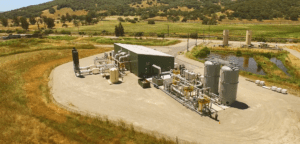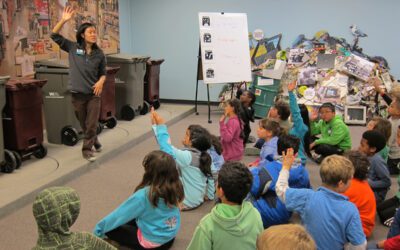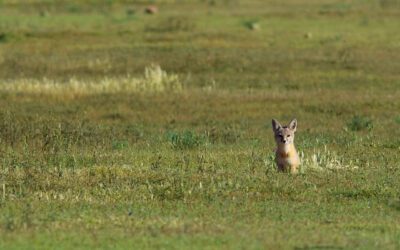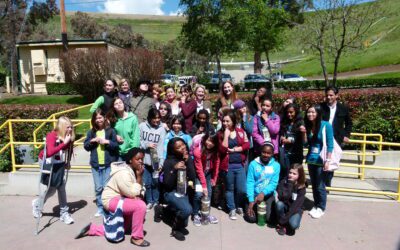Field trips to the award-winning irecycle@school Education Center offer students an opportunity to learn first-hand what happens to their...
Redwood Landfill Composting Guide
Redwood Landfill is the largest composting facility in Marin County. Our Homegrown Compost is listed by the Organic Materials Review Institute (ORMI) and complies with the US Composting Council Seal of Testing Assurance. Residential yard trimmings and food scraps collected by Marin Sanitary Service, Mill Valley Refuse and Novato Disposal are combined with private hauler yard trimmings to make compost.
In This Guide
Is Compost for Organic Farming Different?
Yes. Compost that is suitable for use in organic food production in California must be registered as an Organic Input Material with the California Department of Food and Agriculture. This means only a very limited, if any, amount and type of synthetic (i.e. paper and cardboard) material can be included. Investigators conduct routine sampling and inspections, respond to consumer complaints and make sure facilities comply with the laws and regulations.
What Compostable Materials are Accepted at Redwood Landfill?
Imagine everything you put into your compost cart coming back in your food.

Food Scraps
Fruits and vegetables (skins, seeds & pits), seafood bones & shells, grains, bread, eggs & shells, dairy (cheese, butter & yogurt), meat & bones and congealed grease (in paper container).

Food-Soiled Paper
Paper napkins, paper towels, uncoated paper plates (no surface sheen) and greasy pizza boxes, coffee grounds and paper filters, paper tea bags.

Paper Bags, Newspaper & Shredded Paper
Bills & envelopes (no padded or window envelopes & magazines), paper bags.

Yard Trimmings & Untreated Wood
Grass clippings, leaves, plant and tree trimmings, untreated Wood – no plywood, painted or stained wood.
What Materials Can’t be Composted at Redwood?
Some items labeled as compostable or bio-degradable on their packaging are not recognized by the US Department of Agriculture as feedstock for compost used in organic farming. Since Redwood Landfill’s WM EarthCare composting operation is committed to generating ORMI-approved compost, this limits some of the materials we’re able to accept.
Unacceptable Items for Composting at Redwood Landfill Include:
* Not USDA approved for organic farming |
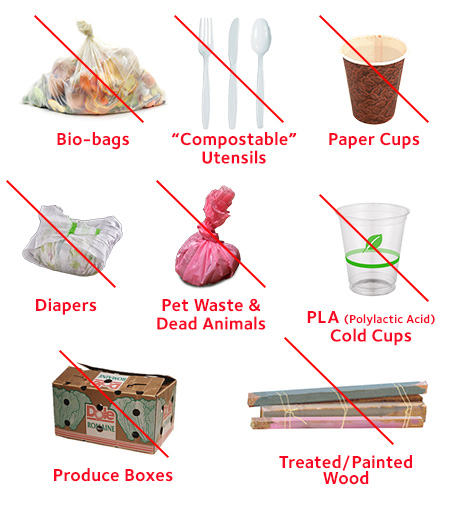 |
Composting Tips
Tips for Collecting Food Scraps
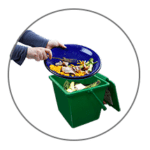 |
COLLECT: Use a kitchen pail, a reusable plastic tub or paper bags. Include food-soiled paper such as coffee filters and tea bags, paper plates, napkins, and paper towels. Freezing food scraps or wrapping them in newspaper can prevent leaks and odors. |
 |
SEPARATE: Separate food scraps while preparing meals, scraping plates and cleaning the fridge. |
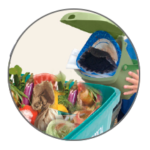 |
EMPTY: Empty food scraps, food-soiled paper and plant debris into green compost cart. |
Tips for Keeping Organics Cart Clean
Placing woody materials and paper products in your organics cart naturally reduces odor.
- Include yard trimmings (especially leaves and woody material)
- Place cardboard or newspapers in bottom of cart
- Use paper bags to contain food scraps
- Add shredded paper – all your bills and personal papers are compostable
Where Are Marin’s Organics Composted?
Nearly 90 percent of Marin’s organics (food scraps and yard trimmings) go to Redwood Landfill’s WM EarthCare of Marin composting facility in Novato. This state-of-the-art composting facility produces compost approved for organic farming. Residents can be proud that their discarded organics are used to grow food and nourish local soil. WM EarthCare Homegrown Compost carries the industry’s highest standards of excellence.
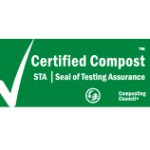 |
USCC Seal of Testing AssuranceUS Composting Council created testing protocols to ensure that compost is tested to the highest industry standard and that consumers have information on the quality of the compost that they are using. USCC Certified laboratories test compost to measure: pH; Soluble Salts; Nutrient Content (Nitrogen, Phosphorus and Potassium); Organic Matter; Moisture Content; Particle Size; Maturity; Stability; contamination, Metals; and Pathogens. WM tests batches weekly and makes results available to the public. To read more about the test, visit US Composting Council. To see testing results go to www.wmearthcare.com. |
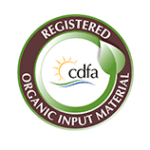 |
CDFA RegisteredThe California Department of Food and Agriculture conducts site visits to participating composters and takes independent samples to validate compost nutrition claims (1 percent nitrogen for WM Earthcare Homegrown Compost) and inspects feedstock and the composting process to ensure that it is compliant with the US Department of Agriculture National Organics Program. |
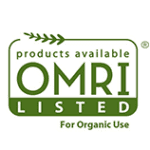 |
OMRI ListedThe Organic Materials Review Institute is a non-profit that provides an independent review of compost intended for use in certified organic production. Acceptable products are OMRI Listed. |
About This Facility
Did You Know?
Californians landfill nearly six million tons of food each year? In landfills, decomposing organic material generates methane, one of the most potent greenhouse gases. That’s why the State of California and most cities and towns in the Bay Area enacted legislation requiring the composting of yard trimmings and food scraps.
Related Content
A Certified Wildlife Habitat at Work
Nestled among the windmill-doted hills of the Altamont Pass, the landfill blends into the surrounding grasslands. A modern landfill, the Altamont is...
Altamont In The Community
The Altamont Landfill is a vital resource to our immediate neighbors and the community at large. Annually, the landfill generates millions of...

